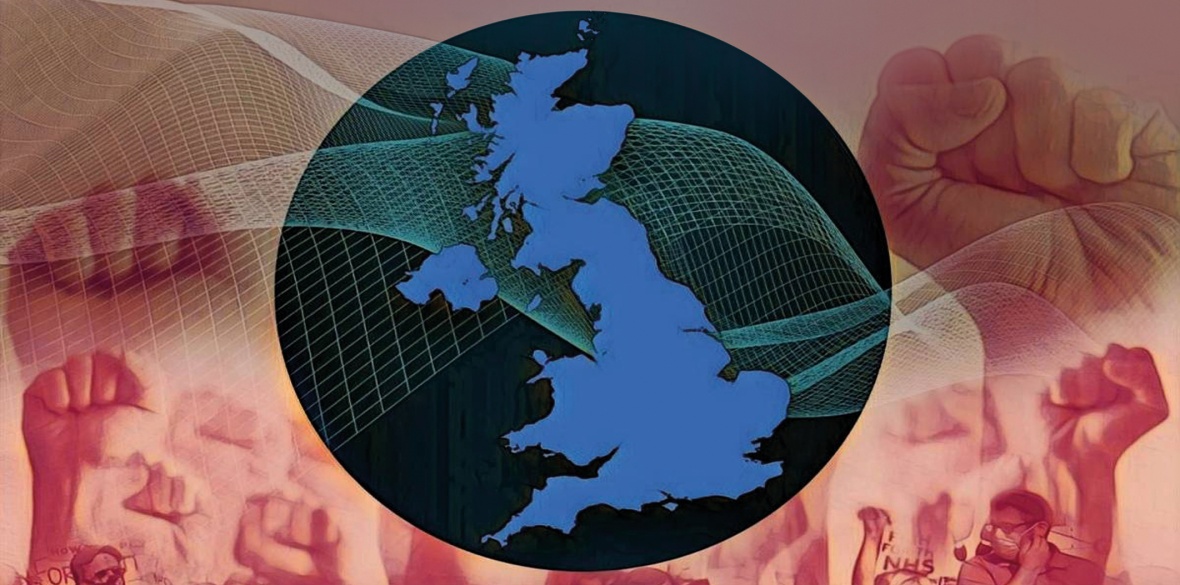This is the last article you can read this month
You can read more article this month
You can read more articles this month
Sorry your limit is up for this month
Reset on:
Please help support the Morning Star by subscribing here
THE new pamphlet from John Foster, Nations and Working-Class Unity, provides an accessible contemporary Marxist perspective on the interrelationship of class and national identities among the nations of Britain.
Foster is the author of numerous pamphlets, articles and papers on this topic over several decades. However, this contribution comes at a particularly critical moment for the left in Britain.
As the recent waves of industrial action by workers across Britain show, there remains a strong material basis for working-class unity, despite national differences. However, since the 1990s, these national differences within Britain have also taken institutional form, resulting in a fragmented political landscape.
Rishi Sunak’s Tories may control the Westminster Parliament, but Humza Yousaf’s Scottish National Party, factionalised as it is, still rules the roost in the Scottish Parliament, and the Labour Party’s Mark Drakeford, measurably to the left of Labour’s British leader Keir Starmer, presides over the Welsh Senedd.
If we can identify progressive all-British unity in the class struggle, it nonetheless co-exists with splintered divisions on national levels — how should the left respond?
As the author makes clear, the pamphlet is applicable to the constituent nations of Britain alone, it explicitly does not aim to cover the national question in general, nor the quite different relation between Britain and Ireland, based as that is on colonial and imperialist domination.
Foster concisely outlines the processes by which the elites of Scotland and Wales were co-opted into a common capitalist and later imperialist project — the United Kingdom. Yet this never extinguished the popular attachments to Scottish or Welsh national identity, lending a special complexity to what constitutes the so-called “British nation.”
He brings out the unifying elements of all-Britain working-class history, the great strikes that brought together miners from Fife, Yorkshire, Kent and the Rhondda, to the multinational coalitions that fought fascism from Cable Street to Jarama.
Communists have played a significant role in a progressive all-Britain culture, particularly during the period of the Popular Front against fascism, when cultural artists of all fields joined or worked with communists.
However, no less important was the contribution of communists to the renaissance of Scottish and Welsh national cultures, with Hugh MacDiarmid and TE Nicholas, respectively, pioneering these efforts.
The pamphlet also notes the efforts, especially in the 1930s, to rescue English history and culture from the still dominant narrative that focuses on tales of domestic royalty and plutocracy, English hegemony over the other nations of Britain, and a bloody record of international colonialism and imperialism.
The alternative approach was epitomised by the works of Marxist historians, most famously by AL Morton’s A People’s History of England, which brought to the fore the popular anti-feudal and anti-capitalist struggles of English peasants, artisans and workers.
Foster’s approach, drawn from Lenin but elaborated by the Bulgarian communist Georgi Dimitrov, avoids both the narrow economistic approach to the national question and its polar opposite, the assumption that Scottish or Welsh nationalism is inherently progressive.
Foster reaches into the works of Marx, Lenin, Dimitrov and James Connolly, the Edinburgh-born revolutionary socialist who gave his life in the struggle to free Ireland from British imperialism. Here he finds ample support for his perspective.
The concept that every nation has two cultures, one broadly reflecting the ruling elites and the other one forged at the grassroots, has been a recurring motif of Foster’s work since the 1970s, when sections of the left and ultra-left were often dismissive of the resurgence of the national question within Britain.
Decades later, these very same nationalisms became a bandwagon for them to follow, if not climb aboard.
Nations and Working-Class Unity in Britain is a timely contribution to an unavoidable debate about whether national-based separatisms or a unifying class-based politics — including the proposal for progressive federalism — offer the best way forward for the left in Britain.
The pamphlet is available from the Communist Party at www.mstar.link/Nations.












